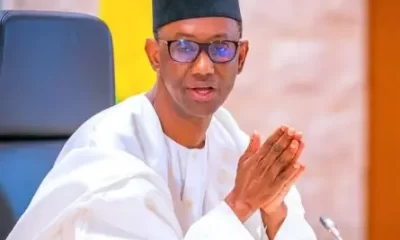Democracy & Governance
EFCC: Corruption, Ethical Violations, Brutality, and Invasions by Officers – At What Point Does It End? -By John Egbeazien Oshodi
In a moment that intertwines irony with solemnity, one might muse about entrusting the EFCC’s destiny to the Afrobeat industry, which, for all its artistic flair, stands as a bastion of organizational prowess and global excellence.

In his penetrating analysis, part of a series of editorials on Nigeria’s challenges, Olu Fasan exposes the Economic and Financial Crimes Commission (EFCC) under Ola Olukoyede’s leadership. Fasan’s critique is a deep dive into the agency, uncovering significant issues of ineptitude and corruption. He depicts Olukoyede as a mere figurehead, susceptible to manipulation by influential figures such as Bola Tinubu, thereby tarnishing the EFCC’s reputation for integrity. Despite Olukoyede’s promises to tackle corruption head-on, the EFCC has, unfortunately, become a symbol of national disgrace, a farce of its intended purpose, and a distorted image of justice.
The EFCC’s recent conduct has further tarnished its already sullied reputation. The high-handed raid on Goodwill Private Schools Limited in Ikorodu, Lagos, on June 24, epitomizes this descent. In a display of brute force, EFCC operatives invaded the school premises, taking into custody the principal, Olufemi-King Saidat, and an employee, Collins Success Omodekah, in full view of terrified students. This unwarranted intrusion, executed without a shred of legal justification, not only disrupted the educational process but also inflicted psychological harm on the young learners, betraying a profound disrespect for their welfare and the sanctity of learning environments.
Benson Enikuomehin, representing the school, issued a strong rebuke, highlighting the absence of a warrant and the lack of accountability in the EFCC’s actions. His words, “The EFCC’s conduct was devoid of any legal basis, causing unwarranted distress to our students,” encapsulate the arbitrary and damaging nature of the agency’s approach. This incident, symptomatic of a larger pattern, raises profound concerns about the EFCC’s operational philosophy and its impact on the rule of law.
As Nigeria confronts the EFCC’s questionable tactics, it becomes imperative to reexamine the agency’s role in the fight against corruption. The recurring targeting of entities such as Goodwill Private Schools Limited, without adherence to due process, serves as a poignant reminder of the fine line between enforcing the law and becoming an instrument of injustice. It is a clarion call for a recalibration of the EFCC’s strategies and leadership, to prevent the agency from embodying the very corruption it is tasked with combating.
Even if the EFCC had a justifiable basis for their actions, their execution was fundamentally flawed. The decision to storm a school without a warrant, to publicly humiliate educators in front of their students, and to offer no explanation is not merely incompetent; it borders on tyranny. This approach corrodes the core principles of justice and law enforcement, casting a long shadow over the agency’s credibility.
The EFCC’s conduct at Goodwill Private Schools Limited illuminates a systemic deficiency within the agency: a glaring lack of professionalism and disregard for due process. As of this writing, the EFCC has remained conspicuously silent, failing to address the mounting controversy. This silence amplifies the agency’s apparent inability to uphold the tenets of justice and integrity, sparking grave doubts about its operational ethos and underlying motives.
Compounding these concerns, disturbing footage has emerged, revealing EFCC operatives allegedly engaging in violence at the Annex and Regional hotels in Isashi, Lagos. The CCTV footage captures a harrowing scene where operatives forcibly enter a hotel room, physically assaulting a woman clad in a nightgown, subjecting her to repeated slaps. Unbeknownst to them, their actions were being recorded as they proceeded to ransack the room, forcibly evicting the young woman.
This incident sheds light on the EFCC’s propensity for excessive force. The footage, obtained by SaharaReporters, shows operatives indiscriminately firing their weapons within the hotel premises, instilling fear and causing panic among innocent guests seeking respite. The chaotic scenes captured on camera serve as a stark reminder of the operatives’ reckless conduct, prompting urgent questions about the agency’s modus operandi.
While it is a positive step that the EFCC has initiated action against the operatives involved in this particular incident, it raises a broader question: What about the countless other abuses that go unrecorded? How many instances of power being wielded without accountability slip through the cracks, unchecked and unpunished, simply because there is no visual evidence to hold the perpetrators to account?
In the heart of a society deeply compromised, where the path into the force is sometimes paved with connections, payments, and bribes, and where the standards of pre-enlistment screenings are diluted, it is no surprise that we find ourselves inundated with officers lacking in integrity and professionalism, not just within the EFCC, but across various agencies. This systemic failure in recruitment and vetting processes has given rise to a force that is a mirror of the very corruption it is meant to fight.
The tragedy deepens when we consider that even if some of these officers were to be dismissed and face legal consequences, the judiciary—as it stands today—has been described by some honest judges as a marketplace for corrupt judgments. This sobering reality only underscores the depth of our challenges.
Integrating the EFCC into the Nigeria Police Force, which is itself riddled with problems, would not offer a viable solution. It would resemble the fusion of two flawed systems, intensifying the issues rather than resolving them. The journey towards reform must initiate with stringent pre-employment background checks, coupled with thorough psychological, financial, drug, and alcohol evaluations. This approach is crucial to transform Nigeria’s law enforcement agencies, ensuring they are populated with individuals who possess integrity and professionalism. It is imperative for law enforcement agencies, including the EFCC, to engage with professional and innovative bodies such as the Nigerian Association of Psychology. The leadership of this association, which can be contacted through the Nasarawa State University, Keffi, Nasarawa, is well-positioned to provide unbiased pre-employment assessments and other forms of assistance, thereby contributing to the much-needed reform in Nigeria’s law enforcement sector.
In a stark juxtaposition, the Independent Corrupt Practices Commission (ICPC) demonstrates a quieter but steadfast approach, focusing on low-profile cases and making meaningful strides without the need for spectacle. The EFCC, once a name that evoked respect and fear, now seems like a child mimicking authority, lost in pretense.
In the culmination of our discourse, we find a convergence of voices, from Olu Fasan’s piercing critique to the Oba of Benin’s somber reflections, and even Ola Olukoyede’s contemplative admissions, collectively illustrating an agency enmeshed in a labyrinth of corruption and political chicanery, woefully deficient in its pursuit of its noble objectives. The EFCC, as it currently operates, is not merely a disappointment; it is a blemish upon the nation’s honor, a farce that corrodes the very essence of its mandate. It is, in truth, a toothless bulldog, enfeebled in its quest for justice, and in dire need of reform or, if the situation warrants, dismantling. Nigeria, a nation that hungers for justice and equity, deserves an institution that champions these ideals, not one that belittles them.
It is our collective duty to lift our voices in harmony, demanding a system that embodies the virtues of justice, integrity, and professionalism that we hold sacred. We must labor tirelessly towards the establishment of a law enforcement agency that radiates hope, rather than despair.
In a moment that intertwines irony with solemnity, one might muse about entrusting the EFCC’s destiny to the Afrobeat industry, which, for all its artistic flair, stands as a bastion of organizational prowess and global excellence. This industry, with its adept navigation of the global landscape while upholding a bedrock of integrity and success, offers a compelling lesson in leadership and governance. It serves as a reminder that leadership transcends traditional boundaries; in vibrant societies, leadership is synonymous with competence, vision, and the power to ignite change.
Let us speak candidly about the leadership quandaries within the EFCC. The agency’s tribulations cannot be solely attributed to Chairman Ola Olukoyede or his immediate predecessors, who may have harbored sincere aspirations for improvement. The roots of the problem delve deeper into a society where systemic flaws overshadow individual ambitions, exacerbating issues rather than resolving them. The journey toward meaningful reform must commence with meticulous pre-employment scrutiny, including psychological, financial, and substance abuse assessments. These foundational reforms are essential to transform Nigeria’s law enforcement agencies, ensuring they are staffed by individuals of unimpeachable integrity and professionalism. By laying these robust foundations, we can sculpt a more effective and trustworthy EFCC, poised to confront the nation’s challenges head-on.
Thus, it is incumbent upon Nigeria to explore unorthodox avenues of leadership, shattering the bonds of tradition and embracing a future sculpted by merit and capability, not cronyism or political expediency. On a comically serious note, perhaps we should consider handing over the EFCC to the Afrobeat industry. The Afrobeat industry in Nigeria stands out as a beacon of organizational efficiency and global standards. There is a valuable lesson to be learned from an industry that knows how to run an organization with integrity and success. The mistake Nigeria makes is assuming that only insiders, promoted from within, can head law enforcement agencies. This is not the case in functional societies.
Nigeria must break away from the flawed notion that only insiders can lead effectively. The path to reform is fraught with obstacles, but it is a journey we must embark upon to forge a Nigeria that truly embodies the aspirations of its populace. By embracing merit-based leadership and implementing comprehensive pre-employment screenings, we can create a law enforcement system that upholds justice and integrity. Only then can we ensure that the EFCC and other agencies are not merely symbols of authority but actual instruments of positive change and accountability.
Professor John Egbeazien Oshodi, born in Uromi, Edo State, Nigeria, is an American-based police and prison scientist, forensic psychologist, public policy psychologist, and legal psychologist. He’s a government advisor on forensic-clinical psychological services in the USA and the founder of the Dr. John Egbeazien Oshodi Foundation for Psychological Health. With a significant role in introducing forensic psychology to Nigeria through N.U.C. and Nasarawa State University, he’s also a former Secretary-General of the Nigeria Psychological Association. He’s taught at esteemed institutions like Florida Memorial University, Florida International University, Nova Southeastern University, and more, and is currently an online faculty member at Weldios University, Nexus International University, and Walden University. John.Oshodi@mail.waldenu.edu










